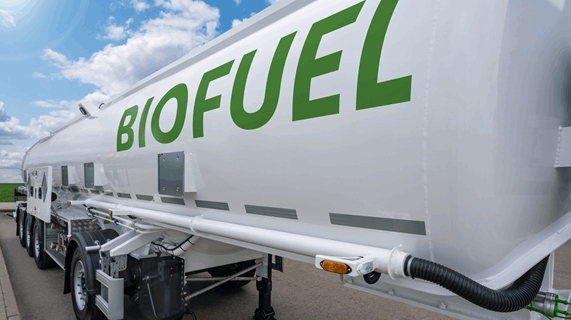
Starting Jan. 1, 2026, the minimum 5 percent renewable-fuel requirement for gasoline must be met with eligible renewable fuels produced in Canada.
Starting Jan. 1, 2026, the minimum 5 percent renewable-fuel requirement for gasoline must be met with eligible renewable fuels produced in Canada, according to a statement from the government.
Further, the renewable-fuel requirement for diesel of 4 percent will immediately be increased to 8 percent. Beginning April 1, the renewable content of diesel fuel must be produced in Canada.
According to the statement, B.C. and Canadian biofuel producers “have long felt the impact of the competitive advantage American producers have over Canadian producers because of U.S. subsidies, which have increased under the U.S. Inflation Reduction Act”.
To support B.C. and Canadian biofuel producers, protect local jobs throughout the supply chain, and strengthen British Columbia’s energy security, the provincial government said it is making key amendments to regulations under the Low Carbon Fuels Act that prioritize the inclusion of Canadian biofuels in B.C.’s transportation fuels.
“This action will stabilize the biofuel market and support B.C. companies such as Tidewater Renewables in Prince George, Parkland in Burnaby and Consolidated Biofuels in Delta,” the statement said.
“British Columbians deserve a reliable, sustainable and Canadian fuel supply,” said Adrian Dix, Minister of Energy and Climate Solutions. “By increasing the Canadian biofuel content in our transportation fuels, we will support local producers, protect jobs and reduce our dependence on foreign energy. This action reflects our commitment to cleaner energy, economic growth and a resilient future for British Columbians”.
“We welcome the Government of B.C.’s changes to the Low Carbon Fuels Act and the commitment to strengthen the Canadian biofuel sector,” Tidewater Renewables President and CEO Jeremy Baines said. “This is a good first step in leveling the playing field with imported biofuels that take advantage of overlapping foreign and Canadian policies, and moving toward an economically viable Canadian renewable fuel industry. Tidewater is committed to being a leader in the energy transition, continuing to develop made-in-B.C. energy solutions, creating good-paying jobs in British Columbia and continuing to supply low-carbon fuels, helping British Columbia and Canada meet emission-reduction targets”.
Mark Zacharias, executive director for Clean Energy Canada, said, “We are pleased to see today’s amendments to the Low Carbon Fuels Regulation. These changes will provide certainty to B.C. and Canadian biofuel producers, while connecting the Canadian biofuel supply chain and supporting the province's clean-energy economy. In the face of potential U.S. tariffs, these changes will create jobs here in B.C., while doing our part for the climate”.
Consolidate Biofuels CEO Dan Treleaven said, “This news is welcome support for local homegrown biofuel producers. Securing and growing local production reduces reliance on imports, while maintaining one of the most progressive carbon-reduction programs in Canada”.
According to the statement, the Low Carbon Fuel Standard (LCFS) is one of B.C.’s most effective climate policies, avoiding more than 3.7 million metric tons of greenhouse gas emissions globally in 2023, and a total of more than 22.6 million metric tons between 2010 and 2023.
The LCFS was implemented in 2010, requiring fuel suppliers to blend a minimum percentage of renewable fuels, also known as biofuels, with gasoline, diesel and jet fuel and to progressively lower the carbon intensity of the fuels they supply in B.C.